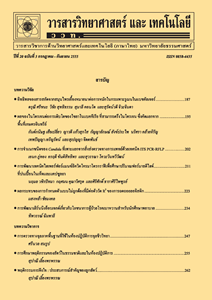ประสบการณ์ของสามีหลังภรรยาตัดมดลูก
Main Article Content
Abstract
บทคัดย่อ
การศึกษาเชิงคุณภาพครั้งนี้มีเป้าหมายเพื่อทำความเข้าใจประสบการณ์ของสามีภายหลังภรรยาได้รับการตัดมดลูก ทำการศึกษาจากสามีที่อยู่กินกับภรรยาหลังภรรยาตัดมดลูกออกไปแล้วเป็นเวลา 1 ปีขึ้นไป จำนวน 23 คน ในพื้นที่ภาคกลาง อายุระหว่าง 42-75 ปี ด้วยวิธีสัมภาษณ์เชิงลึกและการสังเกตแบบไม่มีส่วนร่วม รวบรวมข้อมูลจนกระทั่งข้อมูลถึงจุดอิ่มตัว วิเคราะห์ข้อมูลโดยใช้การวิเคราะห์เชิงเนื้อหา ได้ข้อค้นพบ 3 สาระสำคัญ คือ (1) การรับรู้ผลที่ตามมาทั้งด้านบวกและด้านลบของการที่ภรรยาไม่มีมดลูก (2) การเปลี่ยนแปลงความสัมพันธ์ชายหญิงระหว่างสามี-ภรรยา : มีทั้งดีขึ้น ไม่เปลี่ยนแปลง และไม่ดีขึ้น (3) ความต้องการการดูแลสุขภาพหลังการตัดมดลูกของภรรยาและสามี ข้อค้นพบนี้ชี้ให้เห็นว่าการทำความเข้าใจประสบการณ์ของสามีของผู้หญิงที่ตัดมดลูกมีความสำคัญต่อสุขภาพของผู้หญิง ประสบการณ์ของสามีชี้ให้เห็นว่าประเด็นเพศภาวะและการดูแลที่มีความละเอียดอ่อนเชิงเพศภาวะของผู้ให้การดูแลมีความสำคัญต่อการจัดการดูแลสุขภาพสำหรับผู้หญิงหลังการตัดมดลูกและสามีทั้งในระยะสั้นและระยะยาว
คำสำคัญ : การตัดมดลูก; ประสบการณ์ของสามี; ความละเอียดอ่อนเชิงเพศภาวะ; การวิจัยเชิงคุณภาพ
Abstract
This qualitative study aims to describe husbands’ experiences in relation to wives’ hysterectomy for more than one year. Twenty three participants were living in a province in Central of Thailand. Data were collected using in-depth interviews and non-participatory observations until saturation. Content analyses were used for data analysis. Findings found three main themes emerged: (1) perceived effects were loss and gain after hysterectomy, (2) changed family relations were positive, negative, and no change conditions, (3) needed gender sensitive care both women and her husband after hysterectomy. These findings were concluded that understanding in couples’ experiences should contribute significantly women’s health. The husbands’ experiences showed that gender issues and gender sensitive care of health care providers are crucial for caring women and their husband after hysterectomy in short and long term care.
Keywords: hysterectomy; husbands’ experiences; gender sensitive care; qualitative research


